HNN301 Mental Health Promotion: Case Study Analysis and Strategies
VerifiedAdded on 2023/06/08
|8
|2524
|253
Case Study
AI Summary
This case study examines the challenges faced by a nurse named Tom, who experiences stress due to shift work, workplace bullying, and family responsibilities. The analysis delves into the impact of these stressors on his mental health and explores potential interventions to promote well-being. These interventions include addressing workplace issues through complaints, seeking family support, and engaging in stress-reducing activities. The study emphasizes the importance of distinguishing between professional and personal life, improving organizational culture, and promoting healthy coping mechanisms such as hobbies, balanced diets, and social gatherings. The role of professional counselors and the avoidance of sedatives are also highlighted as crucial components of mental health promotion in the nursing profession. The case study concludes by advocating for a holistic approach to well-being, incorporating physical, emotional, and social aspects to mitigate the detrimental effects of occupational hazards.
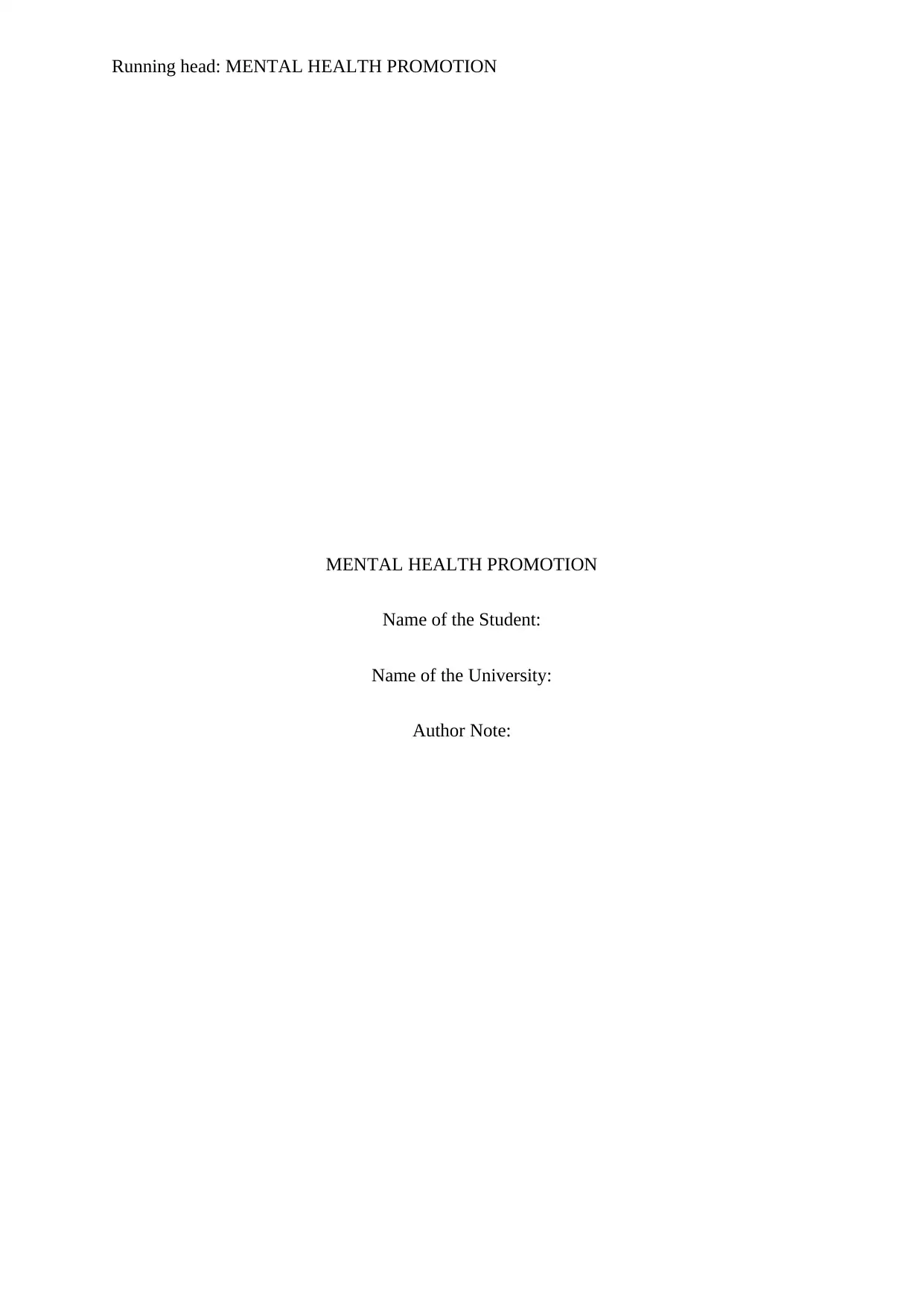
Running head: MENTAL HEALTH PROMOTION
MENTAL HEALTH PROMOTION
Name of the Student:
Name of the University:
Author Note:
MENTAL HEALTH PROMOTION
Name of the Student:
Name of the University:
Author Note:
Paraphrase This Document
Need a fresh take? Get an instant paraphrase of this document with our AI Paraphraser
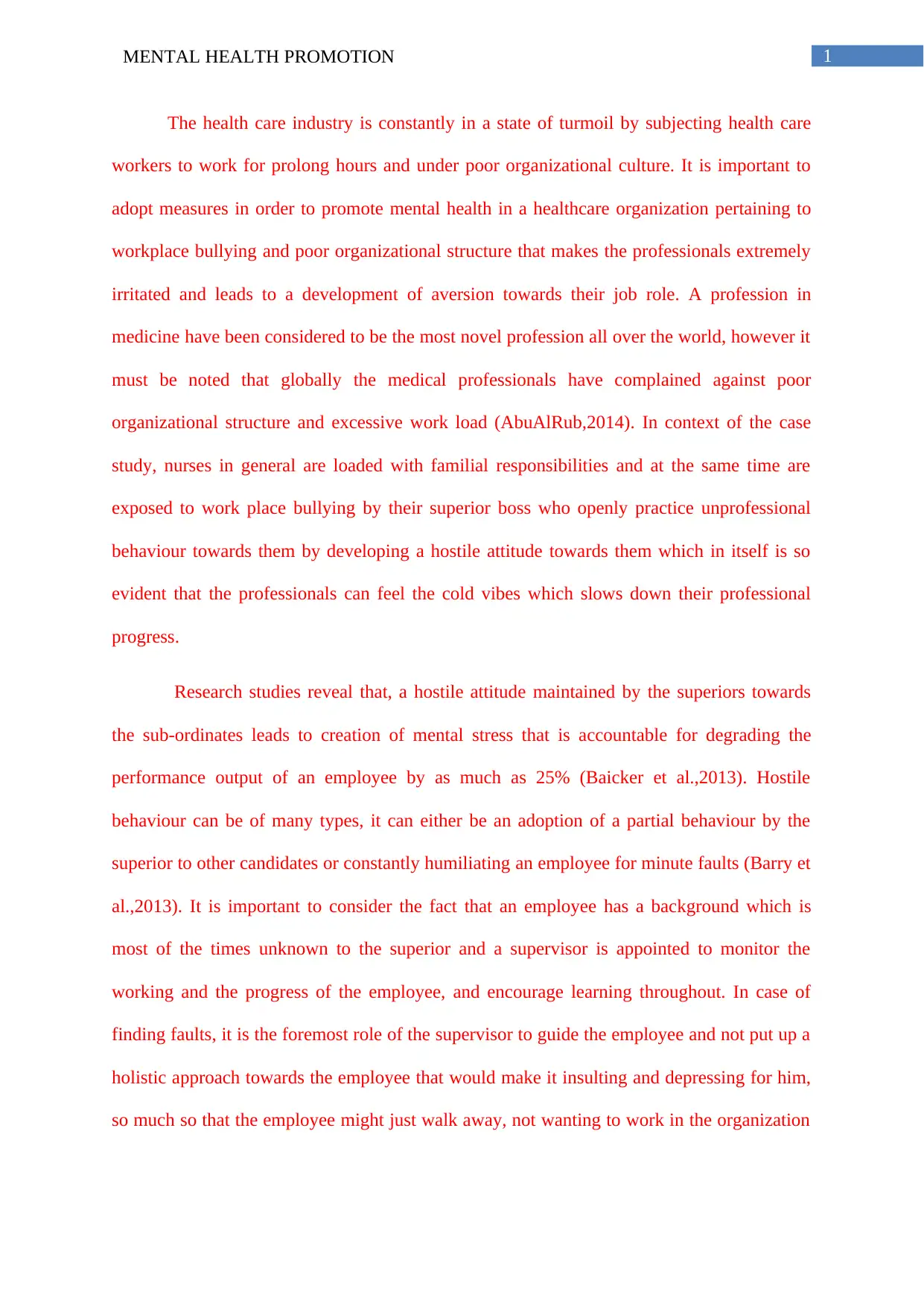
MENTAL HEALTH PROMOTION 1
The health care industry is constantly in a state of turmoil by subjecting health care
workers to work for prolong hours and under poor organizational culture. It is important to
adopt measures in order to promote mental health in a healthcare organization pertaining to
workplace bullying and poor organizational structure that makes the professionals extremely
irritated and leads to a development of aversion towards their job role. A profession in
medicine have been considered to be the most novel profession all over the world, however it
must be noted that globally the medical professionals have complained against poor
organizational structure and excessive work load (AbuAlRub,2014). In context of the case
study, nurses in general are loaded with familial responsibilities and at the same time are
exposed to work place bullying by their superior boss who openly practice unprofessional
behaviour towards them by developing a hostile attitude towards them which in itself is so
evident that the professionals can feel the cold vibes which slows down their professional
progress.
Research studies reveal that, a hostile attitude maintained by the superiors towards
the sub-ordinates leads to creation of mental stress that is accountable for degrading the
performance output of an employee by as much as 25% (Baicker et al.,2013). Hostile
behaviour can be of many types, it can either be an adoption of a partial behaviour by the
superior to other candidates or constantly humiliating an employee for minute faults (Barry et
al.,2013). It is important to consider the fact that an employee has a background which is
most of the times unknown to the superior and a supervisor is appointed to monitor the
working and the progress of the employee, and encourage learning throughout. In case of
finding faults, it is the foremost role of the supervisor to guide the employee and not put up a
holistic approach towards the employee that would make it insulting and depressing for him,
so much so that the employee might just walk away, not wanting to work in the organization
The health care industry is constantly in a state of turmoil by subjecting health care
workers to work for prolong hours and under poor organizational culture. It is important to
adopt measures in order to promote mental health in a healthcare organization pertaining to
workplace bullying and poor organizational structure that makes the professionals extremely
irritated and leads to a development of aversion towards their job role. A profession in
medicine have been considered to be the most novel profession all over the world, however it
must be noted that globally the medical professionals have complained against poor
organizational structure and excessive work load (AbuAlRub,2014). In context of the case
study, nurses in general are loaded with familial responsibilities and at the same time are
exposed to work place bullying by their superior boss who openly practice unprofessional
behaviour towards them by developing a hostile attitude towards them which in itself is so
evident that the professionals can feel the cold vibes which slows down their professional
progress.
Research studies reveal that, a hostile attitude maintained by the superiors towards
the sub-ordinates leads to creation of mental stress that is accountable for degrading the
performance output of an employee by as much as 25% (Baicker et al.,2013). Hostile
behaviour can be of many types, it can either be an adoption of a partial behaviour by the
superior to other candidates or constantly humiliating an employee for minute faults (Barry et
al.,2013). It is important to consider the fact that an employee has a background which is
most of the times unknown to the superior and a supervisor is appointed to monitor the
working and the progress of the employee, and encourage learning throughout. In case of
finding faults, it is the foremost role of the supervisor to guide the employee and not put up a
holistic approach towards the employee that would make it insulting and depressing for him,
so much so that the employee might just walk away, not wanting to work in the organization
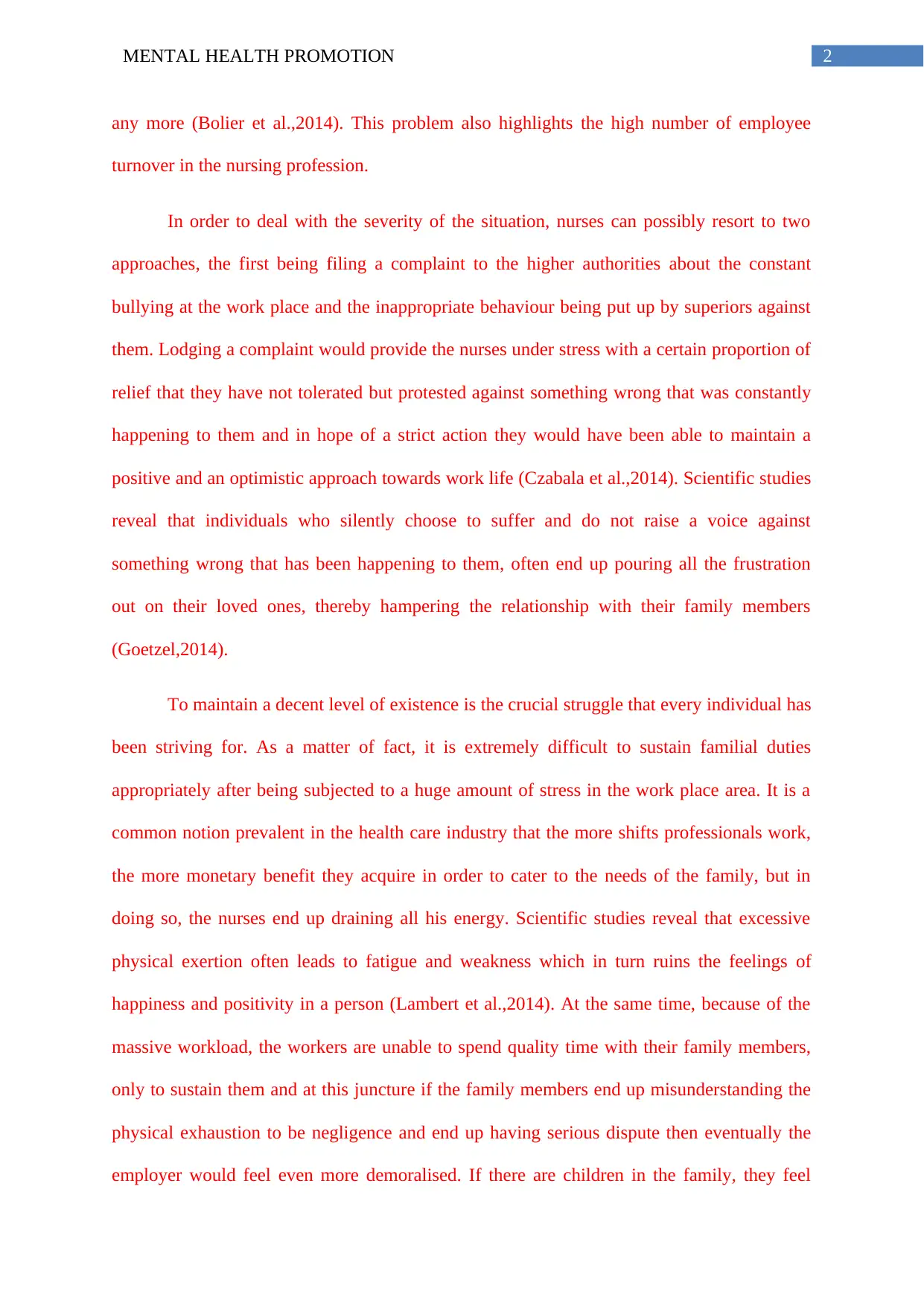
2MENTAL HEALTH PROMOTION
any more (Bolier et al.,2014). This problem also highlights the high number of employee
turnover in the nursing profession.
In order to deal with the severity of the situation, nurses can possibly resort to two
approaches, the first being filing a complaint to the higher authorities about the constant
bullying at the work place and the inappropriate behaviour being put up by superiors against
them. Lodging a complaint would provide the nurses under stress with a certain proportion of
relief that they have not tolerated but protested against something wrong that was constantly
happening to them and in hope of a strict action they would have been able to maintain a
positive and an optimistic approach towards work life (Czabala et al.,2014). Scientific studies
reveal that individuals who silently choose to suffer and do not raise a voice against
something wrong that has been happening to them, often end up pouring all the frustration
out on their loved ones, thereby hampering the relationship with their family members
(Goetzel,2014).
To maintain a decent level of existence is the crucial struggle that every individual has
been striving for. As a matter of fact, it is extremely difficult to sustain familial duties
appropriately after being subjected to a huge amount of stress in the work place area. It is a
common notion prevalent in the health care industry that the more shifts professionals work,
the more monetary benefit they acquire in order to cater to the needs of the family, but in
doing so, the nurses end up draining all his energy. Scientific studies reveal that excessive
physical exertion often leads to fatigue and weakness which in turn ruins the feelings of
happiness and positivity in a person (Lambert et al.,2014). At the same time, because of the
massive workload, the workers are unable to spend quality time with their family members,
only to sustain them and at this juncture if the family members end up misunderstanding the
physical exhaustion to be negligence and end up having serious dispute then eventually the
employer would feel even more demoralised. If there are children in the family, they feel
any more (Bolier et al.,2014). This problem also highlights the high number of employee
turnover in the nursing profession.
In order to deal with the severity of the situation, nurses can possibly resort to two
approaches, the first being filing a complaint to the higher authorities about the constant
bullying at the work place and the inappropriate behaviour being put up by superiors against
them. Lodging a complaint would provide the nurses under stress with a certain proportion of
relief that they have not tolerated but protested against something wrong that was constantly
happening to them and in hope of a strict action they would have been able to maintain a
positive and an optimistic approach towards work life (Czabala et al.,2014). Scientific studies
reveal that individuals who silently choose to suffer and do not raise a voice against
something wrong that has been happening to them, often end up pouring all the frustration
out on their loved ones, thereby hampering the relationship with their family members
(Goetzel,2014).
To maintain a decent level of existence is the crucial struggle that every individual has
been striving for. As a matter of fact, it is extremely difficult to sustain familial duties
appropriately after being subjected to a huge amount of stress in the work place area. It is a
common notion prevalent in the health care industry that the more shifts professionals work,
the more monetary benefit they acquire in order to cater to the needs of the family, but in
doing so, the nurses end up draining all his energy. Scientific studies reveal that excessive
physical exertion often leads to fatigue and weakness which in turn ruins the feelings of
happiness and positivity in a person (Lambert et al.,2014). At the same time, because of the
massive workload, the workers are unable to spend quality time with their family members,
only to sustain them and at this juncture if the family members end up misunderstanding the
physical exhaustion to be negligence and end up having serious dispute then eventually the
employer would feel even more demoralised. If there are children in the family, they feel
⊘ This is a preview!⊘
Do you want full access?
Subscribe today to unlock all pages.

Trusted by 1+ million students worldwide
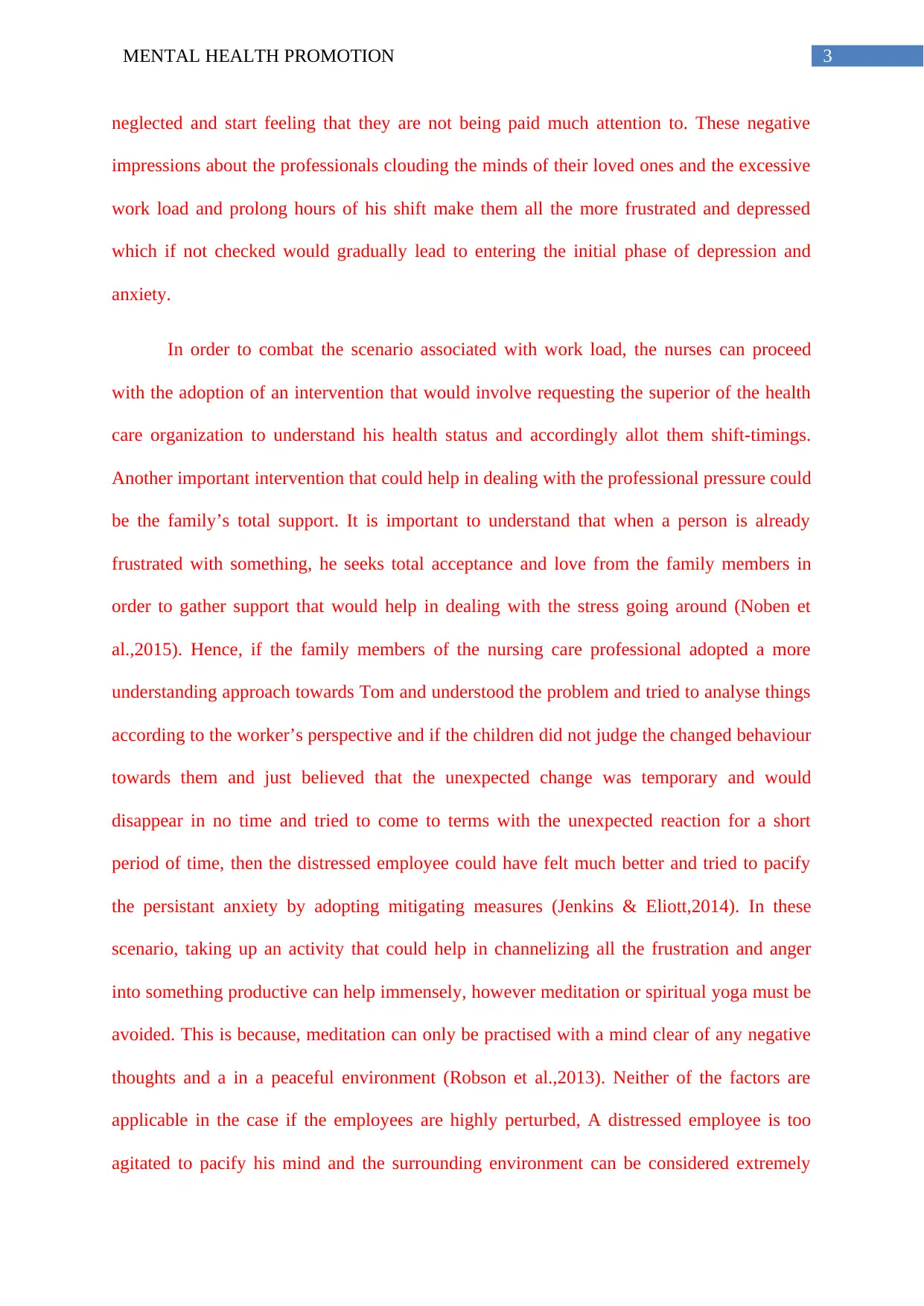
3MENTAL HEALTH PROMOTION
neglected and start feeling that they are not being paid much attention to. These negative
impressions about the professionals clouding the minds of their loved ones and the excessive
work load and prolong hours of his shift make them all the more frustrated and depressed
which if not checked would gradually lead to entering the initial phase of depression and
anxiety.
In order to combat the scenario associated with work load, the nurses can proceed
with the adoption of an intervention that would involve requesting the superior of the health
care organization to understand his health status and accordingly allot them shift-timings.
Another important intervention that could help in dealing with the professional pressure could
be the family’s total support. It is important to understand that when a person is already
frustrated with something, he seeks total acceptance and love from the family members in
order to gather support that would help in dealing with the stress going around (Noben et
al.,2015). Hence, if the family members of the nursing care professional adopted a more
understanding approach towards Tom and understood the problem and tried to analyse things
according to the worker’s perspective and if the children did not judge the changed behaviour
towards them and just believed that the unexpected change was temporary and would
disappear in no time and tried to come to terms with the unexpected reaction for a short
period of time, then the distressed employee could have felt much better and tried to pacify
the persistant anxiety by adopting mitigating measures (Jenkins & Eliott,2014). In these
scenario, taking up an activity that could help in channelizing all the frustration and anger
into something productive can help immensely, however meditation or spiritual yoga must be
avoided. This is because, meditation can only be practised with a mind clear of any negative
thoughts and a in a peaceful environment (Robson et al.,2013). Neither of the factors are
applicable in the case if the employees are highly perturbed, A distressed employee is too
agitated to pacify his mind and the surrounding environment can be considered extremely
neglected and start feeling that they are not being paid much attention to. These negative
impressions about the professionals clouding the minds of their loved ones and the excessive
work load and prolong hours of his shift make them all the more frustrated and depressed
which if not checked would gradually lead to entering the initial phase of depression and
anxiety.
In order to combat the scenario associated with work load, the nurses can proceed
with the adoption of an intervention that would involve requesting the superior of the health
care organization to understand his health status and accordingly allot them shift-timings.
Another important intervention that could help in dealing with the professional pressure could
be the family’s total support. It is important to understand that when a person is already
frustrated with something, he seeks total acceptance and love from the family members in
order to gather support that would help in dealing with the stress going around (Noben et
al.,2015). Hence, if the family members of the nursing care professional adopted a more
understanding approach towards Tom and understood the problem and tried to analyse things
according to the worker’s perspective and if the children did not judge the changed behaviour
towards them and just believed that the unexpected change was temporary and would
disappear in no time and tried to come to terms with the unexpected reaction for a short
period of time, then the distressed employee could have felt much better and tried to pacify
the persistant anxiety by adopting mitigating measures (Jenkins & Eliott,2014). In these
scenario, taking up an activity that could help in channelizing all the frustration and anger
into something productive can help immensely, however meditation or spiritual yoga must be
avoided. This is because, meditation can only be practised with a mind clear of any negative
thoughts and a in a peaceful environment (Robson et al.,2013). Neither of the factors are
applicable in the case if the employees are highly perturbed, A distressed employee is too
agitated to pacify his mind and the surrounding environment can be considered extremely
Paraphrase This Document
Need a fresh take? Get an instant paraphrase of this document with our AI Paraphraser
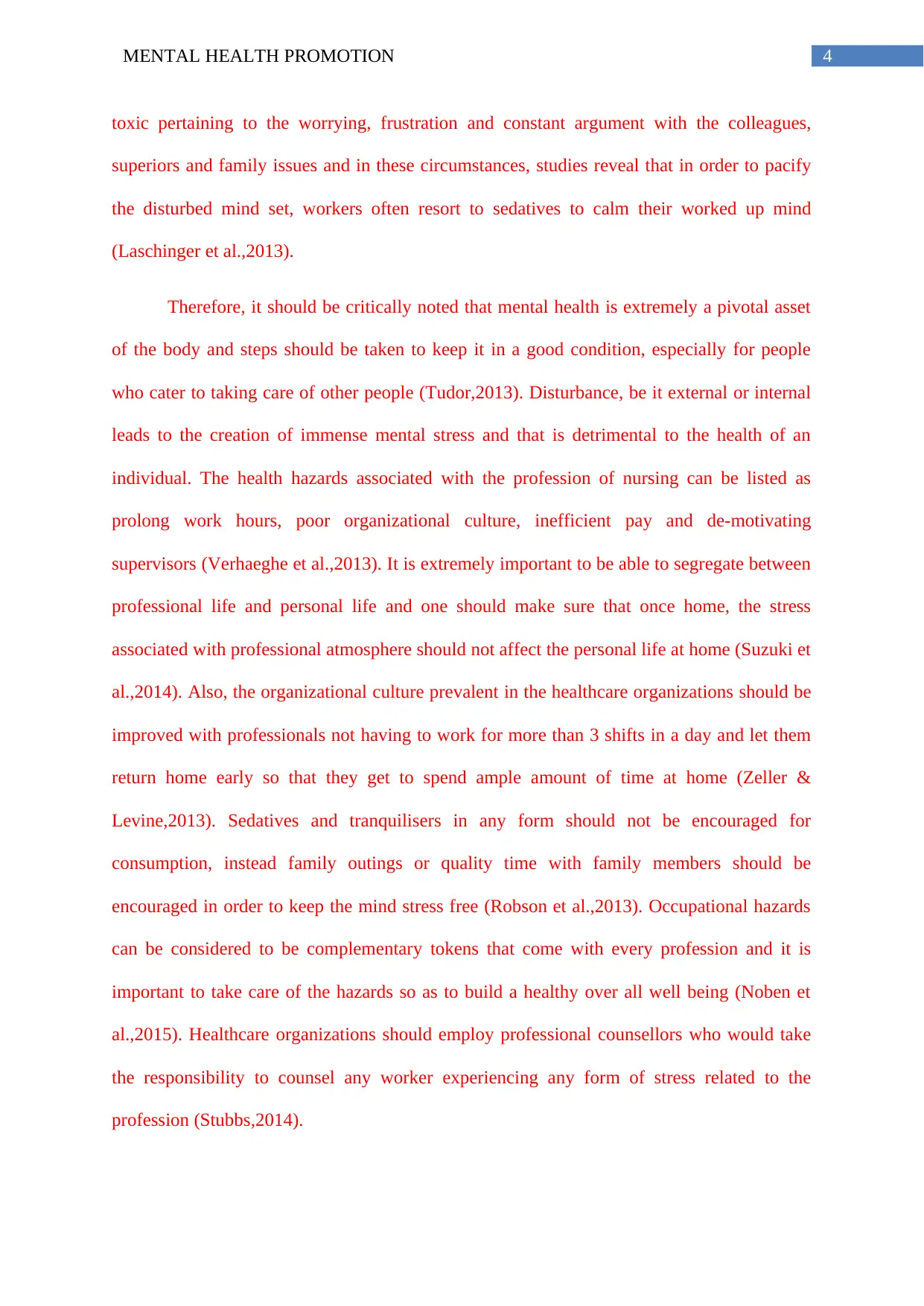
4MENTAL HEALTH PROMOTION
toxic pertaining to the worrying, frustration and constant argument with the colleagues,
superiors and family issues and in these circumstances, studies reveal that in order to pacify
the disturbed mind set, workers often resort to sedatives to calm their worked up mind
(Laschinger et al.,2013).
Therefore, it should be critically noted that mental health is extremely a pivotal asset
of the body and steps should be taken to keep it in a good condition, especially for people
who cater to taking care of other people (Tudor,2013). Disturbance, be it external or internal
leads to the creation of immense mental stress and that is detrimental to the health of an
individual. The health hazards associated with the profession of nursing can be listed as
prolong work hours, poor organizational culture, inefficient pay and de-motivating
supervisors (Verhaeghe et al.,2013). It is extremely important to be able to segregate between
professional life and personal life and one should make sure that once home, the stress
associated with professional atmosphere should not affect the personal life at home (Suzuki et
al.,2014). Also, the organizational culture prevalent in the healthcare organizations should be
improved with professionals not having to work for more than 3 shifts in a day and let them
return home early so that they get to spend ample amount of time at home (Zeller &
Levine,2013). Sedatives and tranquilisers in any form should not be encouraged for
consumption, instead family outings or quality time with family members should be
encouraged in order to keep the mind stress free (Robson et al.,2013). Occupational hazards
can be considered to be complementary tokens that come with every profession and it is
important to take care of the hazards so as to build a healthy over all well being (Noben et
al.,2015). Healthcare organizations should employ professional counsellors who would take
the responsibility to counsel any worker experiencing any form of stress related to the
profession (Stubbs,2014).
toxic pertaining to the worrying, frustration and constant argument with the colleagues,
superiors and family issues and in these circumstances, studies reveal that in order to pacify
the disturbed mind set, workers often resort to sedatives to calm their worked up mind
(Laschinger et al.,2013).
Therefore, it should be critically noted that mental health is extremely a pivotal asset
of the body and steps should be taken to keep it in a good condition, especially for people
who cater to taking care of other people (Tudor,2013). Disturbance, be it external or internal
leads to the creation of immense mental stress and that is detrimental to the health of an
individual. The health hazards associated with the profession of nursing can be listed as
prolong work hours, poor organizational culture, inefficient pay and de-motivating
supervisors (Verhaeghe et al.,2013). It is extremely important to be able to segregate between
professional life and personal life and one should make sure that once home, the stress
associated with professional atmosphere should not affect the personal life at home (Suzuki et
al.,2014). Also, the organizational culture prevalent in the healthcare organizations should be
improved with professionals not having to work for more than 3 shifts in a day and let them
return home early so that they get to spend ample amount of time at home (Zeller &
Levine,2013). Sedatives and tranquilisers in any form should not be encouraged for
consumption, instead family outings or quality time with family members should be
encouraged in order to keep the mind stress free (Robson et al.,2013). Occupational hazards
can be considered to be complementary tokens that come with every profession and it is
important to take care of the hazards so as to build a healthy over all well being (Noben et
al.,2015). Healthcare organizations should employ professional counsellors who would take
the responsibility to counsel any worker experiencing any form of stress related to the
profession (Stubbs,2014).
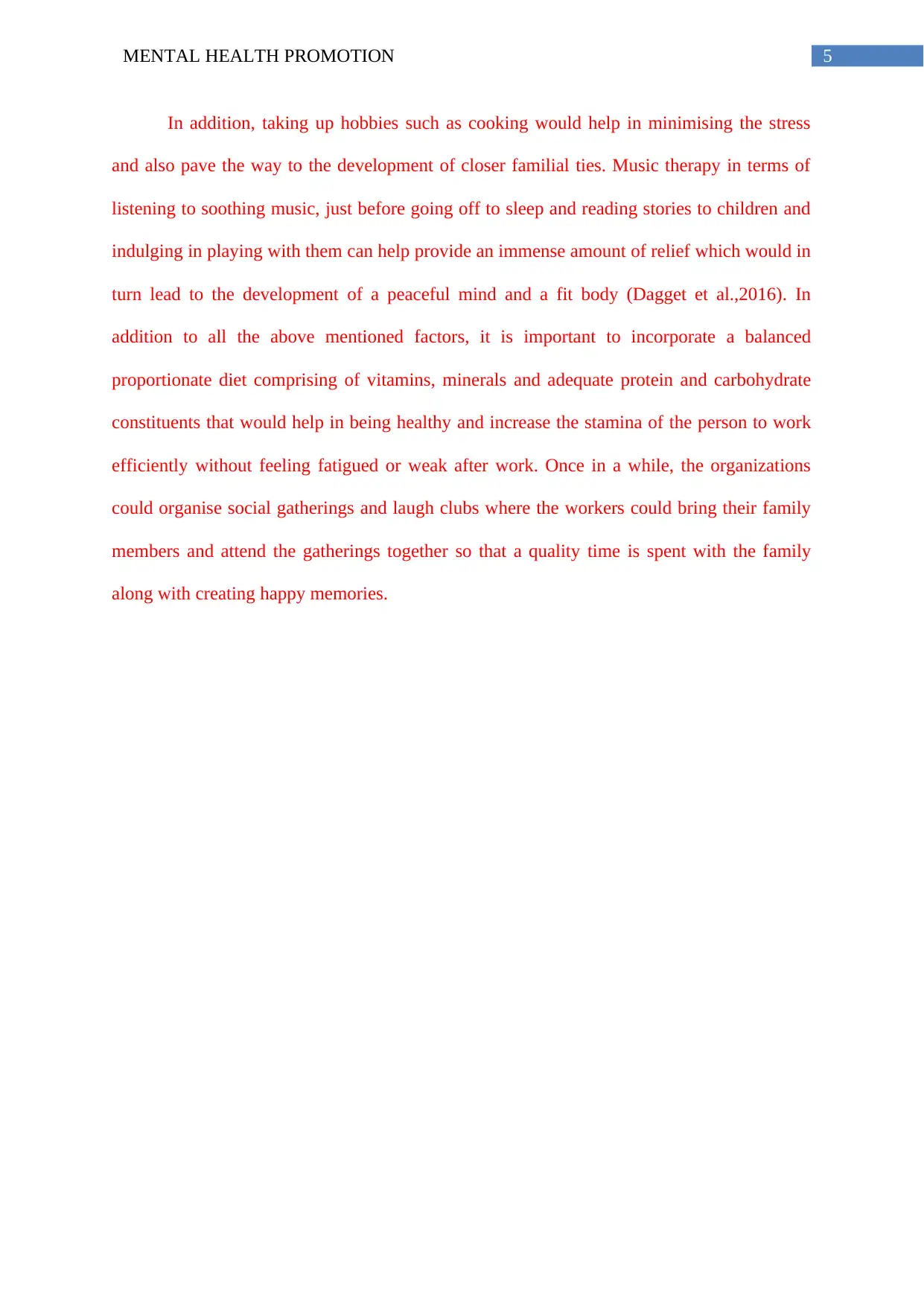
5MENTAL HEALTH PROMOTION
In addition, taking up hobbies such as cooking would help in minimising the stress
and also pave the way to the development of closer familial ties. Music therapy in terms of
listening to soothing music, just before going off to sleep and reading stories to children and
indulging in playing with them can help provide an immense amount of relief which would in
turn lead to the development of a peaceful mind and a fit body (Dagget et al.,2016). In
addition to all the above mentioned factors, it is important to incorporate a balanced
proportionate diet comprising of vitamins, minerals and adequate protein and carbohydrate
constituents that would help in being healthy and increase the stamina of the person to work
efficiently without feeling fatigued or weak after work. Once in a while, the organizations
could organise social gatherings and laugh clubs where the workers could bring their family
members and attend the gatherings together so that a quality time is spent with the family
along with creating happy memories.
In addition, taking up hobbies such as cooking would help in minimising the stress
and also pave the way to the development of closer familial ties. Music therapy in terms of
listening to soothing music, just before going off to sleep and reading stories to children and
indulging in playing with them can help provide an immense amount of relief which would in
turn lead to the development of a peaceful mind and a fit body (Dagget et al.,2016). In
addition to all the above mentioned factors, it is important to incorporate a balanced
proportionate diet comprising of vitamins, minerals and adequate protein and carbohydrate
constituents that would help in being healthy and increase the stamina of the person to work
efficiently without feeling fatigued or weak after work. Once in a while, the organizations
could organise social gatherings and laugh clubs where the workers could bring their family
members and attend the gatherings together so that a quality time is spent with the family
along with creating happy memories.
⊘ This is a preview!⊘
Do you want full access?
Subscribe today to unlock all pages.

Trusted by 1+ million students worldwide
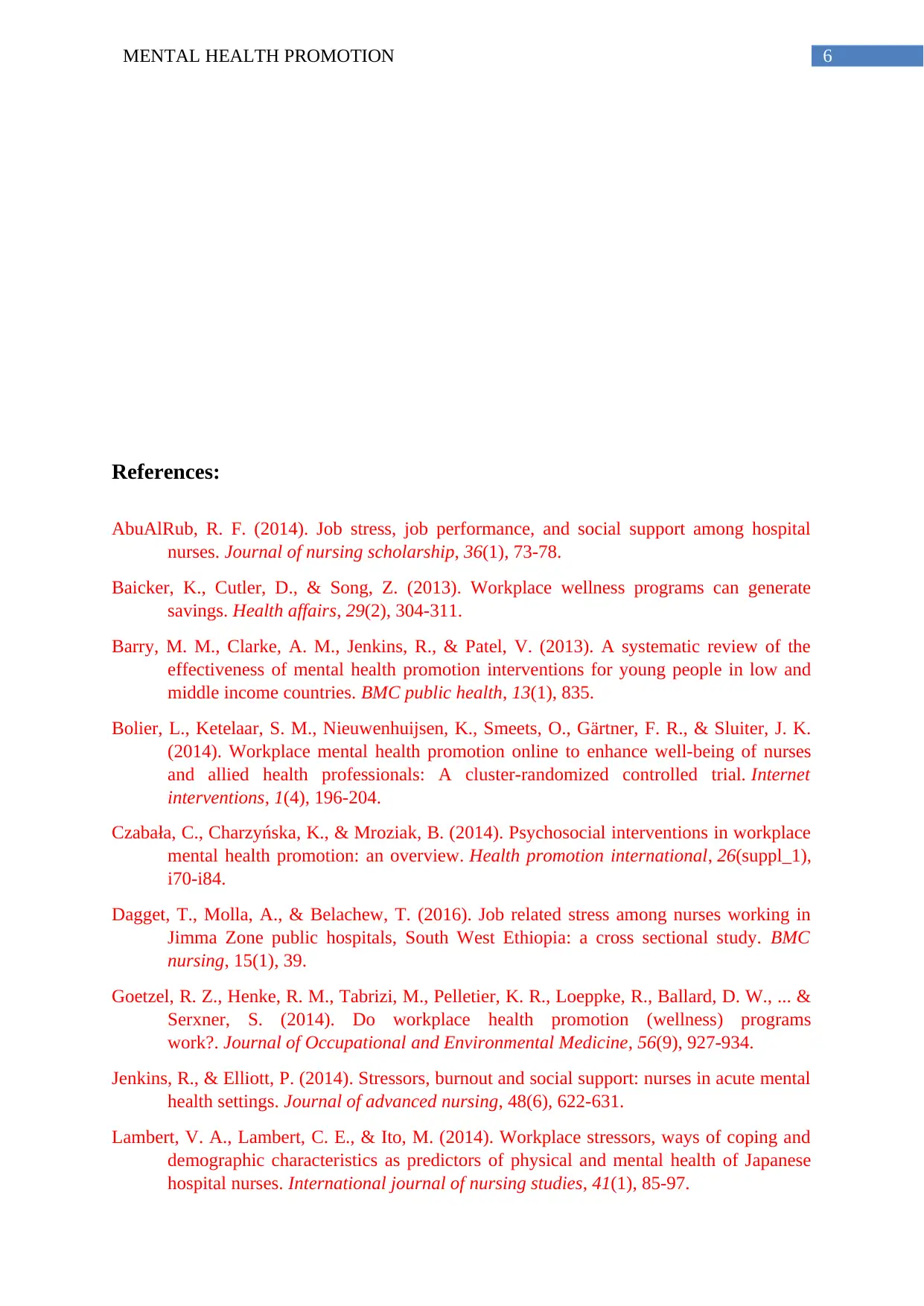
6MENTAL HEALTH PROMOTION
References:
AbuAlRub, R. F. (2014). Job stress, job performance, and social support among hospital
nurses. Journal of nursing scholarship, 36(1), 73-78.
Baicker, K., Cutler, D., & Song, Z. (2013). Workplace wellness programs can generate
savings. Health affairs, 29(2), 304-311.
Barry, M. M., Clarke, A. M., Jenkins, R., & Patel, V. (2013). A systematic review of the
effectiveness of mental health promotion interventions for young people in low and
middle income countries. BMC public health, 13(1), 835.
Bolier, L., Ketelaar, S. M., Nieuwenhuijsen, K., Smeets, O., Gärtner, F. R., & Sluiter, J. K.
(2014). Workplace mental health promotion online to enhance well-being of nurses
and allied health professionals: A cluster-randomized controlled trial. Internet
interventions, 1(4), 196-204.
Czabała, C., Charzyńska, K., & Mroziak, B. (2014). Psychosocial interventions in workplace
mental health promotion: an overview. Health promotion international, 26(suppl_1),
i70-i84.
Dagget, T., Molla, A., & Belachew, T. (2016). Job related stress among nurses working in
Jimma Zone public hospitals, South West Ethiopia: a cross sectional study. BMC
nursing, 15(1), 39.
Goetzel, R. Z., Henke, R. M., Tabrizi, M., Pelletier, K. R., Loeppke, R., Ballard, D. W., ... &
Serxner, S. (2014). Do workplace health promotion (wellness) programs
work?. Journal of Occupational and Environmental Medicine, 56(9), 927-934.
Jenkins, R., & Elliott, P. (2014). Stressors, burnout and social support: nurses in acute mental
health settings. Journal of advanced nursing, 48(6), 622-631.
Lambert, V. A., Lambert, C. E., & Ito, M. (2014). Workplace stressors, ways of coping and
demographic characteristics as predictors of physical and mental health of Japanese
hospital nurses. International journal of nursing studies, 41(1), 85-97.
References:
AbuAlRub, R. F. (2014). Job stress, job performance, and social support among hospital
nurses. Journal of nursing scholarship, 36(1), 73-78.
Baicker, K., Cutler, D., & Song, Z. (2013). Workplace wellness programs can generate
savings. Health affairs, 29(2), 304-311.
Barry, M. M., Clarke, A. M., Jenkins, R., & Patel, V. (2013). A systematic review of the
effectiveness of mental health promotion interventions for young people in low and
middle income countries. BMC public health, 13(1), 835.
Bolier, L., Ketelaar, S. M., Nieuwenhuijsen, K., Smeets, O., Gärtner, F. R., & Sluiter, J. K.
(2014). Workplace mental health promotion online to enhance well-being of nurses
and allied health professionals: A cluster-randomized controlled trial. Internet
interventions, 1(4), 196-204.
Czabała, C., Charzyńska, K., & Mroziak, B. (2014). Psychosocial interventions in workplace
mental health promotion: an overview. Health promotion international, 26(suppl_1),
i70-i84.
Dagget, T., Molla, A., & Belachew, T. (2016). Job related stress among nurses working in
Jimma Zone public hospitals, South West Ethiopia: a cross sectional study. BMC
nursing, 15(1), 39.
Goetzel, R. Z., Henke, R. M., Tabrizi, M., Pelletier, K. R., Loeppke, R., Ballard, D. W., ... &
Serxner, S. (2014). Do workplace health promotion (wellness) programs
work?. Journal of Occupational and Environmental Medicine, 56(9), 927-934.
Jenkins, R., & Elliott, P. (2014). Stressors, burnout and social support: nurses in acute mental
health settings. Journal of advanced nursing, 48(6), 622-631.
Lambert, V. A., Lambert, C. E., & Ito, M. (2014). Workplace stressors, ways of coping and
demographic characteristics as predictors of physical and mental health of Japanese
hospital nurses. International journal of nursing studies, 41(1), 85-97.
Paraphrase This Document
Need a fresh take? Get an instant paraphrase of this document with our AI Paraphraser
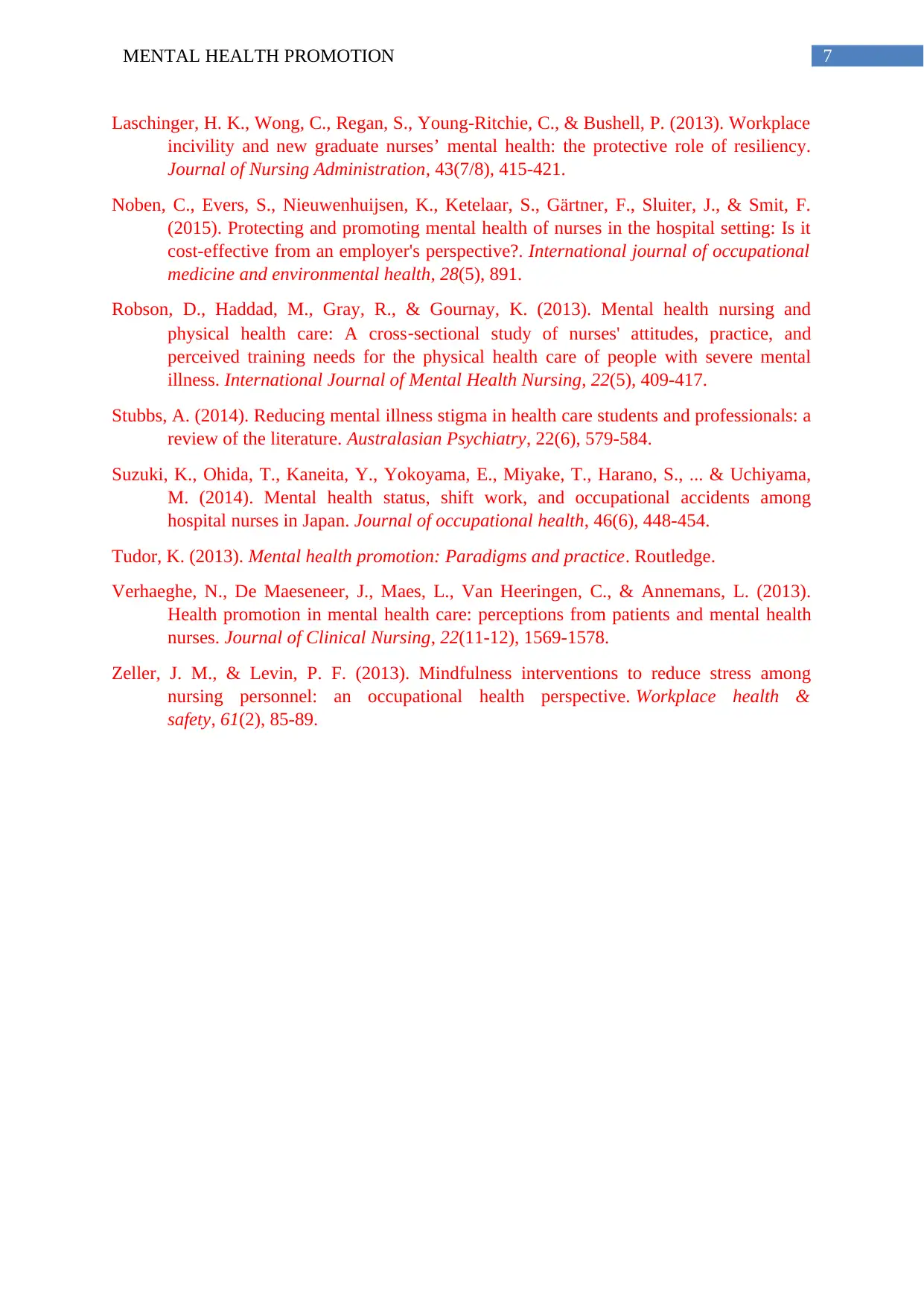
7MENTAL HEALTH PROMOTION
Laschinger, H. K., Wong, C., Regan, S., Young-Ritchie, C., & Bushell, P. (2013). Workplace
incivility and new graduate nurses’ mental health: the protective role of resiliency.
Journal of Nursing Administration, 43(7/8), 415-421.
Noben, C., Evers, S., Nieuwenhuijsen, K., Ketelaar, S., Gärtner, F., Sluiter, J., & Smit, F.
(2015). Protecting and promoting mental health of nurses in the hospital setting: Is it
cost-effective from an employer's perspective?. International journal of occupational
medicine and environmental health, 28(5), 891.
Robson, D., Haddad, M., Gray, R., & Gournay, K. (2013). Mental health nursing and
physical health care: A cross‐sectional study of nurses' attitudes, practice, and
perceived training needs for the physical health care of people with severe mental
illness. International Journal of Mental Health Nursing, 22(5), 409-417.
Stubbs, A. (2014). Reducing mental illness stigma in health care students and professionals: a
review of the literature. Australasian Psychiatry, 22(6), 579-584.
Suzuki, K., Ohida, T., Kaneita, Y., Yokoyama, E., Miyake, T., Harano, S., ... & Uchiyama,
M. (2014). Mental health status, shift work, and occupational accidents among
hospital nurses in Japan. Journal of occupational health, 46(6), 448-454.
Tudor, K. (2013). Mental health promotion: Paradigms and practice. Routledge.
Verhaeghe, N., De Maeseneer, J., Maes, L., Van Heeringen, C., & Annemans, L. (2013).
Health promotion in mental health care: perceptions from patients and mental health
nurses. Journal of Clinical Nursing, 22(11-12), 1569-1578.
Zeller, J. M., & Levin, P. F. (2013). Mindfulness interventions to reduce stress among
nursing personnel: an occupational health perspective. Workplace health &
safety, 61(2), 85-89.
Laschinger, H. K., Wong, C., Regan, S., Young-Ritchie, C., & Bushell, P. (2013). Workplace
incivility and new graduate nurses’ mental health: the protective role of resiliency.
Journal of Nursing Administration, 43(7/8), 415-421.
Noben, C., Evers, S., Nieuwenhuijsen, K., Ketelaar, S., Gärtner, F., Sluiter, J., & Smit, F.
(2015). Protecting and promoting mental health of nurses in the hospital setting: Is it
cost-effective from an employer's perspective?. International journal of occupational
medicine and environmental health, 28(5), 891.
Robson, D., Haddad, M., Gray, R., & Gournay, K. (2013). Mental health nursing and
physical health care: A cross‐sectional study of nurses' attitudes, practice, and
perceived training needs for the physical health care of people with severe mental
illness. International Journal of Mental Health Nursing, 22(5), 409-417.
Stubbs, A. (2014). Reducing mental illness stigma in health care students and professionals: a
review of the literature. Australasian Psychiatry, 22(6), 579-584.
Suzuki, K., Ohida, T., Kaneita, Y., Yokoyama, E., Miyake, T., Harano, S., ... & Uchiyama,
M. (2014). Mental health status, shift work, and occupational accidents among
hospital nurses in Japan. Journal of occupational health, 46(6), 448-454.
Tudor, K. (2013). Mental health promotion: Paradigms and practice. Routledge.
Verhaeghe, N., De Maeseneer, J., Maes, L., Van Heeringen, C., & Annemans, L. (2013).
Health promotion in mental health care: perceptions from patients and mental health
nurses. Journal of Clinical Nursing, 22(11-12), 1569-1578.
Zeller, J. M., & Levin, P. F. (2013). Mindfulness interventions to reduce stress among
nursing personnel: an occupational health perspective. Workplace health &
safety, 61(2), 85-89.
1 out of 8
Related Documents
Your All-in-One AI-Powered Toolkit for Academic Success.
+13062052269
info@desklib.com
Available 24*7 on WhatsApp / Email
![[object Object]](/_next/static/media/star-bottom.7253800d.svg)
Unlock your academic potential
Copyright © 2020–2026 A2Z Services. All Rights Reserved. Developed and managed by ZUCOL.





